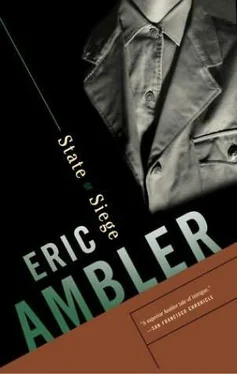Eric Ambler - State of Siege
Здесь есть возможность читать онлайн «Eric Ambler - State of Siege» весь текст электронной книги совершенно бесплатно (целиком полную версию без сокращений). В некоторых случаях можно слушать аудио, скачать через торрент в формате fb2 и присутствует краткое содержание. Год выпуска: 1956, ISBN: 1956, Издательство: Berkley, Жанр: Криминальный детектив, на английском языке. Описание произведения, (предисловие) а так же отзывы посетителей доступны на портале библиотеки ЛибКат.
- Название:State of Siege
- Автор:
- Издательство:Berkley
- Жанр:
- Год:1956
- ISBN:9780425067680
- Рейтинг книги:3 / 5. Голосов: 1
-
Избранное:Добавить в избранное
- Отзывы:
-
Ваша оценка:
- 60
- 1
- 2
- 3
- 4
- 5
State of Siege: краткое содержание, описание и аннотация
Предлагаем к чтению аннотацию, описание, краткое содержание или предисловие (зависит от того, что написал сам автор книги «State of Siege»). Если вы не нашли необходимую информацию о книге — напишите в комментариях, мы постараемся отыскать её.
State of Siege — читать онлайн бесплатно полную книгу (весь текст) целиком
Ниже представлен текст книги, разбитый по страницам. Система сохранения места последней прочитанной страницы, позволяет с удобством читать онлайн бесплатно книгу «State of Siege», без необходимости каждый раз заново искать на чём Вы остановились. Поставьте закладку, и сможете в любой момент перейти на страницу, на которой закончили чтение.
Интервал:
Закладка:
When we were within ten yards of the tank, a lieutenant in the Government uniform stepped out from behind it and held up his hand. I stopped with a jerk that made the staff captain lurch against the back of my seat.
Aroff got out stiffly and stood beside the jeep. When the staff captain and I had joined him, the lieutenant advanced and stopped in front of us.
“Follow me, please,” he said curtly.
He turned then, and we followed him past the tank and over to the gateway. The group of officers was no longer there, only two sentries who stared at us curiously. The lieutenant led the way through into the courtyard of the barracks and the two sentries closed in behind us.
There was a big sago palm in the centre, and a table and chair had been placed in the shade of it. General Ishak sat at the table. Standing behind him were four officers and a civilian. I had never seen Ishak before. He was a thin, bitter-looking man with angry eyes and one of those wispy Sundanese moustaches that look as if they have just been stuck on with spirit gum. More interesting to me at that moment, however, was the fact that just behind him, still haggard but crisp and clean in his proper uniform, stood Major Suparto. As we came up to the table, I saw his eyes flicker towards me, but he gave no sign of recognition.
Aroff stopped and saluted the General.
Ishak did not return the salute. For a moment the two men stared at one another in silence. I was standing a little behind Aroff and I could see the muscles of his jaw twitching. Ishak looked at me.
“Who is this?” I recognised the voice. It was light and ugly, and sounded as if he were trying to speak and swallow at the same time. I had heard it once before that week.
“Mr. Fraser, an engineer from the Tangga Valley project, General. He is here by agreement as an observer.”
“Very well.” He glanced at the civilian who stood next to Suparto. “This is Mr. Petersen of the Malayan Rubber Agency.”
“Dutch?” Aroff demanded sharply.
“Danish,” said Mr. Petersen. He was a stout, fleshy-faced man in the late fifties, wearing a suit as well as a tie and looking as if he might at any moment collapse from the heat. I nodded to him and he smiled nervously.
Ishak yawned. “Although why foreign observers should be necessary to witness a simple police operation is not easy to understand,” he said, and looked up at Aroff. “Well, this meeting is at Sanusi’s request. He can only wish to surrender. It remains for me to inform you about the time and place. You agree?”
“No, General. All I am instructed to discuss are the terms of an armistice.”
“What armistice? What terms?”
Aroff fumbled in his pocket and drew out the document. “I have the proposals here.”
Ishak took the document, glanced through it impassively and then passed it to a colonel, presumably his chief of staff, who was standing behind him. Suparto read it over the colonel’s shoulder. When they had finished, the colonel handed it back to Ishak. The latter glanced through it again and then looked at Aroff.
“Before you became a traitor, Aroff,” he said, “you used to be an intelligent man.” He tore the document in half and dropped the pieces on the table. “What has happened to you?”
“I am here to discuss terms, General.” Aroff’s voice was very carefully controlled.
Ishak flicked the torn paper away from him. “That discussion is ended. If you do not wish to make any personal explanation, then we will waste no more time. You may go.”
Aroff did not move. “The document, General, was intended as a basis for negotiations. It can be modified.”
Ishak shook his head. “It cannot be modified. You are not here to negotiate or to discuss terms. If you are not here to offer surrender, then we are wasting time.” He stood up. “You have five minutes to get back to your lines.”
Aroff hesitated, then he gave in. “On what terms would you accept a surrender, General?”
“I will tell you. Your masters say that they wish to avoid useless suffering and damage to property. So do I. On that point we agree. Very well. I will accept the surrender of all members of your rebel force who disarm themselves, form themselves into separate parties of not more than twenty-five, and march under flags of surrender to the square in front of the railroad station. Each party should appoint a leader who will carry the white flag, and every man must bring any food he has with him. All arms and ammunition must be left behind under guard in the Van Riebeeck square until our troops arrive there.”
“What treatment would those who surrender receive?”
“For the present they will be treated as if they were foreign prisoners of war under the terms of the Geneva Convention. Later, no doubt, after a year, perhaps, an amnesty will be granted. That is all, I think. Do those terms seem harsh to you, Aroff?”
Aroff shook his head.
Ishak smiled unpleasantly. “After what has happened, they seem to me absurdly lenient. Politicians’ terms, Aroff! You should be laughing.”
Aroff sighed. “You were good enough to say that I was an intelligent man, General. You would have more dignity if you treated me as one.”
“What more do you want, Aroff? A free pardon?”
“The list of exceptions, General. The list of those whose surrender will not be accepted.”
“Ah yes, the outlaws.” He held out his hand and Suparto gave him a paper. “Let us see. Sanusi, Roda, Aroff, Dahman … I am sorry to tell you that you are on the list. Shall I read any more?”
“If Major Suparto drew it up, I am sure it is complete.” Aroff looked straight at Suparto, and I was glad I could not see his eyes.
Suparto stared back impassively.
Ishak handed Aroff the paper. “Your masters will want to see that. They have half an hour in which to let us know that they accept our terms.”
“Terms, General?” Aroff said bitterly. “You mean a death sentence, surely!”
“No, Aroff.” Ishak’s eyes narrowed. “That sentence has been passed already. It is no longer a question of whether you all die or not, but only of how you die and of how many of your men die with you. We shall see now what value your leader puts on his men’s lives.” He turned to Suparto. “Send them back.”
Ishak began to walk towards the barrack entrance. Suparto moved after him quickly and said something. Ishak paused. I saw him glance back at me and then nod to Suparto before walking on.
Suparto came over to Aroff.
“Mr. Fraser is a foreigner and a non-combatant. Is it necessary for him to return with you?”
Aroff shrugged. “I don’t know. I suppose not.”
“It is very necessary,” I said.
They both stared at me.
Suparto frowned. “Why?”
“Roda left me in no doubt that he regards Miss Linden as a hostage.”
“That is absurd.”
“It wasn’t absurd yesterday, Major. You should know that.”
“The situation is now different.”
“Not for Miss Linden. She’s still up there in that apartment. I’m very grateful to you for the suggestion, but I think I must go back.”
He sighed irritably. “This is foolishness, Mr. Fraser. The woman is not your wife.”
“Perhaps Mr. Fraser has scruples about betraying those who trust him,” said Aroff.
Suparto stood absolutely still, his face a mask. For a moment he stared at Aroff, then he nodded to the lieutenant who was waiting to escort us back to the jeep.
Aroff was smiling as he turned away.
The jeep had been standing out in the sun and the metal on it was painful to touch. I made a clumsy job of turning it between the deep drains. My movements were hampered, too, by the staff captain, who was leaning forward across the back of my seat, pleading with Aroff.
Читать дальшеИнтервал:
Закладка:
Похожие книги на «State of Siege»
Представляем Вашему вниманию похожие книги на «State of Siege» списком для выбора. Мы отобрали схожую по названию и смыслу литературу в надежде предоставить читателям больше вариантов отыскать новые, интересные, ещё непрочитанные произведения.
Обсуждение, отзывы о книге «State of Siege» и просто собственные мнения читателей. Оставьте ваши комментарии, напишите, что Вы думаете о произведении, его смысле или главных героях. Укажите что конкретно понравилось, а что нет, и почему Вы так считаете.












